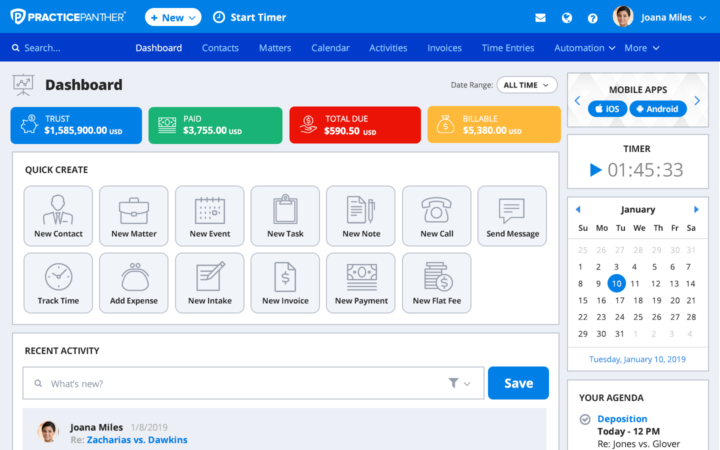Freelance legal work involves attorneys offering their services on a project-by-project basis rather than being employed full-time by a single firm. This model provides flexibility and more unlimited growth potential, but it is not without risk.

What is freelance law?
Freelance law refers to the practice of law where an attorney works on a project-by-project basis, often remotely, and is not employed by a traditional law firm. A freelance lawyer is an independent contractor who provides legal services to clients, often other lawyers or firms, on a temporary or part-time basis.
Freelance law is a growing trend in the legal profession, driven by the increasing demand for flexible and cost-effective legal services. Freelance lawyers can work in various settings, including solo practices, small firms, larger firms, or legal departments, and can specialize in different areas of law, such as litigation, corporate law, intellectual property law, or family law.
A freelance lawyer typically charges clients on an hourly basis, on a project basis, or through fixed fees, and is responsible for managing their own business operations, including client acquisition, marketing, billing, record-keeping, and managing administrative tasks.
To succeed as a freelance lawyer, one needs to have strong legal skills, excellent communication and marketing skills, and the ability to work independently and manage one’s own time effectively.
In terms of legal considerations, freelance lawyers need to be aware of the ethical and legal implications of their work, including issues related to confidentiality, conflicts of interest, and malpractice insurance. A freelance attorney must also comply with the rules of professional conduct in their jurisdiction and ensure that they have the necessary licenses and certifications to practice law.
Overall, freelance law is a dynamic and rapidly evolving field that offers many opportunities for lawyers who want to work flexibly and autonomously.
Working for law firms vs being a freelance attorney.

Choosing between working for a law firm and pursuing a freelance legal career is a significant decision for legal professionals. Both options come with their own advantages and challenges. Below, we break down the pros and cons of each path to help you decide which might be the best fit for your career goals and lifestyle.
Pros of law firm
Steady Stream of Jobs and Income
Law firms provide consistent work, ensuring a stable paycheck and financial predictability, to an extent (no job is guaranteed).
Learning Opportunities
Law firm environments often offer mentorship, collaboration, and exposure to complex cases, allowing attorneys to refine their skills and gain valuable experience without necessarily sticking their whole neck out to perform an unfamiliar task.
Administrative Support
With access to paralegals, legal assistants, and other support staff, attorneys can focus more on practicing law and less on administrative tasks.
Cons of law firm

Office Politics
Navigating interpersonal dynamics and hierarchical structures can sometimes be stressful. The day-to-day politics of working with other legal professionals can be exhausting.
Dictated Schedule
Law firms often demand long hours and adherence to rigid schedules, leaving little room for personal flexibility.
In-Office Requirements
Most firms require a significant on-site presence, limiting remote work options.
Limited Scope
Law firm attorneys may need to focus on narrow practice areas, which can restrict opportunities to diversify skills or take on varied cases.
Less revenue
Generally, you won’t receive more than 33% of the revenue you generate for your firm, and in most cases, that percentage is even smaller.
Pros of freelance

Work-Life Balance
Freelance attorneys enjoy the freedom to set their schedules, which can lead to better work-life balance and the ability to prioritize personal commitments and wellness.
Flexibility in Work Schedule
Freelancers can choose when and how much to work, tailoring their schedules to suit individual needs and preferences.
Location Independence
Freelance work often allows attorneys to work from anywhere, whether it’s their home office, a co-working space, or even while traveling.
Diverse Project Selection
Freelancers have the autonomy to select projects that interest them, leading to varied and engaging work that can make the job more enjoyable.
Potential for Higher Earnings
With the ability to set their rates and take on multiple clients, freelance attorneys can potentially earn more than their salaried counterparts. They also set their own prices
Reduced Overhead Costs
Operating independently can mean lower costs for office space and other traditional business expenses.
Cons of freelance

Managing Your Own Clients
Freelancers are responsible for finding and retaining clients, which can be time-consuming and challenging.
Increased Administrative Responsibilities
From invoicing to tracking billable hours, freelance attorneys handle all administrative tasks themselves (unless they hire out).
No Employer-Provided Benefits
Freelancers must independently secure health insurance, retirement plans, and other benefits typically provided by employers.
Inconsistent Income
Earnings can fluctuate depending on workload, client demand, and economic conditions.
Self-Marketing Requirements
Freelancers need to actively market their services through networking, building an online presence, and maintaining client relationships.
What type of law do you practice?
The benefits and drawbacks of working freelance or as a traditional attorney really do come down to the type of law you’re practicing.
For criminal and high litigation fields, freelance might be more desirable because you can vet your own clients. In a traditional firm, you may be assigned less desirable clients that you might rather not work with.
For something like estate planning, freelance might be more work because you don’t really need to vet clients, so you’re just taking on the responsibility of acquiring them with no direct benefit.
Before deciding to pursue freelance work, consider the needs of your area, how far out you could work with clients geographically, and how well your type of law translates to online services.
What practice areas are best for freelance attorneys?
Most, if not all, areas of practice can be converted to freelance work, but some are more likely to be successful than others. This depends on factors like regional demand, business structure, and state laws.
There are two types of work-for-yourself attorneys: Solo practitioners and freelance attorneys.

Solo Practice: Solo practices account for approximately 40% of all law firms. (Embroker)
Common practice areas for a solo practice includes bankruptcy, civil litigation, family law, estate planning, and immigration law.
Freelance Lawyer: Contract attorneys, also known as freelance attorneys, are independent attorneys who provide legal services on a project-by-project basis.
The freelance legal sector is growing, with 16% of America’s freelancers working in the legal field.
Intellectual property management (69%), document review (57%), and e-discovery (55%) were among the most outsourced legal processes from 2020 to 2023, indicating areas where freelance lawyers may be in demand. (SpotDraft)
Jobs for freelance lawyer.
Freelance lawyering offers a wide array of opportunities that cater to different skill sets and interests. These roles allow lawyers to work on flexible schedules, choose their preferred areas of practice, and gain exposure to diverse cases and industries.

Legal research
Legal research is a cornerstone of freelance legal work. Attorneys often outsource research tasks to freelance lawyers who can delve into case law, statutes, and regulations. This work is a particularly popular service for solo practitioners or small firms that lack the time or resources to handle extensive research in-house.
Document review
Document review is another in-demand service for freelance lawyers. Whether it’s part of a litigation process or due diligence for a corporate transaction, freelance attorneys assist by examining large volumes of documents to identify relevant or privileged information. This work is especially crucial in e-discovery and large-scale litigation cases, offering freelance lawyers steady and repeatable assignments.
Brief writing projects
Freelance lawyers often contribute to trial preparation by drafting legal briefs. This might include motions, memoranda, or appellate briefs. Attorneys specializing in brief writing bring a sharp focus to crafting persuasive arguments while adhering to formatting and procedural rules. Firms benefit by delegating this labor-intensive task to freelancers who can meet tight deadlines without sacrificing quality.
Litigation work
For freelance lawyers with courtroom experience, litigation support can be a lucrative area. This includes tasks such as drafting pleadings, managing discovery, or even providing courtroom assistance during trial preparation. Freelance litigators often work on a project basis, assisting with high-stakes cases where additional legal expertise or manpower is needed.

Providing legal advice
Freelance attorneys can offer valuable insights and guidance on a wide range of legal matters, from contract disputes to regulatory compliance. Their ability to work independently allows them to focus on delivering high-quality legal services without the constraints of a traditional law firm environment.
Contract-Based Services
A good freelance lawyer is increasingly sought after for contract-based services, offering flexible, project-specific solutions to law firms and businesses.
These arrangements allow companies to scale their legal support without the commitment of full-time hires. Whether you’re a solo practitioner in need of temporary help or a corporation handling a surge in workload, hiring freelance lawyers can provide expertise in a cost-effective way. Common areas of focus include litigation support, compliance reviews, and transactional work. It doesn’t hurt to have strong writing skills, a network in the industry, and a lot of gumption.

Document review
Document review is one of the most common tasks handled by freelance lawyers. In this process, attorneys analyze large volumes of documents for relevance, privilege, or specific content in litigation, mergers, or regulatory compliance. Freelancers specializing in document review bring efficiency to time-sensitive projects, ensuring that critical documents are identified quickly and accurately.
Legal research
Freelance lawyers excel in performing deep-dive legal research, a time-intensive task that requires familiarity with case law, statutes, and regulations. By outsourcing this work, law firms can free up in-house attorneys for client-facing or higher-level strategic activities. Freelance lawyers provide concise and reliable research memos that inform case strategies, court filings, or transactional advice, ensuring all legal arguments are backed by robust precedent.
Brief writing
When deadlines loom, freelance lawyers can step in to draft persuasive and meticulously crafted briefs. From trial-level motions to appellate submissions, these attorneys bring specialized expertise to articulate arguments effectively. Their role can be especially critical for boutique firms and solo practitioners managing a high caseload, enabling them to maintain quality advocacy without overextending their resources.
Contract drafting
Freelance lawyers often assist businesses and law firms with drafting contracts, ensuring that the documents are legally sound and tailored to their clients’ specific needs. From employment agreements to commercial leases, these professionals help create clear, enforceable terms that minimize the risk of future disputes. By leveraging freelance talent, firms can access specialized knowledge in various industries and jurisdictions.
Appellate support
Appellate work requires a unique set of skills, including an ability to synthesize trial records and craft compelling legal arguments. Freelance lawyers with appellate expertise offer invaluable support by analyzing lower court decisions, identifying issues for appeal, and drafting briefs. This service is particularly beneficial for smaller firms that may not have dedicated appellate teams but want to provide top-tier representation for their clients.
Specialized Consulting
Freelance lawyers also excel in offering specialized consulting services, helping businesses and legal teams navigate complex or niche areas of the law. This flexibility allows clients to tap into high-level expertise without long-term commitments, saving both time and resources.

Expert witness work
Freelance lawyers with deep expertise in specific legal fields may serve as expert witnesses, lending credibility and clarity to court cases. They provide objective analysis, prepare detailed reports, and testify in depositions or at trial. Their specialized knowledge can strengthen a client’s case by offering professional insights into matters such as legal ethics, contract interpretation, or industry-specific regulations.
Compliance consulting
In today’s complex regulatory landscape, businesses often struggle to remain compliant with evolving laws and standards. Freelance lawyers specializing in compliance consulting can help companies identify potential risks, develop effective policies, and implement compliance training programs. Whether the focus is data privacy, employment law, or environmental regulations, these consultants provide tailored solutions to keep organizations on track and out of legal trouble.
Corporate legal advisory
Corporate clients frequently turn to freelance lawyers for guidance on governance, mergers and acquisitions, or operational strategy. Acting as on-demand legal advisors, these attorneys help businesses navigate legal challenges and make informed decisions. From startup founders seeking advice on entity formation to established companies refining their corporate policies, freelance corporate lawyers bring significant value with their versatile expertise.
Intellectual property consulting
Freelance lawyers specializing in intellectual property (IP) consulting help clients safeguard their creations and innovations. They assist with filing patents, registering trademarks, and drafting licensing agreements, ensuring that businesses protect their valuable assets. For startups and creative professionals, IP consultants can also evaluate infringement risks and advise on intellectual property strategy, laying the groundwork for future growth.
Necessary qualifications
The requirements for being an independent attorney will vary by area, but here are three essential things you need before pursuing a career as a freelance attorney.

Active bar membership
An active bar membership in at least one jurisdiction is a non-negotiable requirement for freelance lawyers. This ensures they are authorized to practice law and can provide legal services within their area of licensing. In some cases, freelance lawyers working on multijurisdictional matters may need to collaborate with attorneys licensed in other states or countries, further emphasizing the importance of staying in good standing with the bar.
Minimum years of legal experience recommended
While there is no universal rule for how much experience is needed, many freelance lawyers find that having at least 3-5 years of practice under their belt helps build credibility and confidence. This experience equips them with the knowledge to handle a variety of legal tasks, from drafting contracts to representing clients in appellate matters.
Specialized skills or niche expertise
Freelance lawyers who succeed often focus on a specific area of law, such as intellectual property, family law, or compliance consulting. Developing niche expertise not only allows attorneys to charge premium rates but also helps them attract a steady stream of clients looking for specialized knowledge. Other valuable skills include strong legal research abilities, exceptional written and oral communication, and proficiency with legal technology tools.
Platforms and Opportunities for Freelance Legal Work

Upwork Legal Services
Upwork is a popular platform for freelance legal services, offering a wide range of opportunities for attorneys to connect with clients. It provides a user-friendly interface and a secure payment system.
Freelance attorney networks
Freelance attorney networks often have a rigorous vetting process to ensure that only qualified attorneys are included, providing clients with confidence in the quality of legal services they receive.
Specialized legal outsourcing platforms
Specialized legal outsourcing platforms cater specifically to the legal industry, offering tailored solutions for both freelance lawyers and clients.
Technology and Tools for Success
A freelance lawyer can maximize efficiency and professionalism by leveraging the right technology and adhering to best practices for client confidentiality and professional development.

Essential Software
The right tools can make freelance legal work more efficient and seamless. Here are a few categories of essential software.
Case Management Platforms: Tools like Clio or PracticePanther help freelance lawyers organize case files, track deadlines, and manage client communications in one centralized system.
Time Tracking Tools: Apps like Toggl or TimeSolv allow you to track billable hours accurately and ensure transparency with clients.
Invoicing Software: Platforms such as QuickBooks or FreshBooks simplify invoicing, payment tracking, and expense management, saving time and reducing administrative burdens.
Secure Document Sharing: Services like Dropbox Professional or ShareFile provide encrypted file-sharing options to keep sensitive documents safe.
Video Conferencing Tools: Reliable platforms like Zoom or Microsoft Teams enable seamless virtual consultations, mediations, and meetings.
Cybersecurity Considerations
Protecting client confidentiality is not just ethical but often legally required. Freelance lawyers should implement robust cybersecurity measures, including:
Protecting Client Confidentiality: Use encrypted email services, secure cloud storage, and two-factor authentication to safeguard sensitive information.
Secure Communication Channels: Opt for encrypted messaging or secure portals for exchanging information with clients and colleagues.
Data Protection Best Practices: Regularly update software, use strong passwords, and avoid accessing client data on public Wi-Fi networks to minimize security risks.

Practical Tips for Thriving as a Freelance Lawyer

Success as a freelance lawyer requires more than just legal knowledge—it demands strong interpersonal skills, organization, and adaptability.
Maintain professional boundaries
Working as a freelancer often blurs the line between professional and personal time. Setting clear boundaries with clients is essential to avoid burnout and maintain work-life balance. Define your availability, response times, and preferred communication methods early on to establish a professional working relationship.
Develop strong communication skills
Clear and effective communication is critical for freelance lawyers. This includes actively listening to clients, setting realistic expectations, and providing regular updates on project progress. By ensuring open and transparent dialogue, you build trust and avoid potential misunderstandings.
Be transparent about capabilities
Honesty is key when managing client expectations. Be upfront about your areas of expertise and any limitations you may have. Clients value authenticity and are more likely to work with you again if they trust your judgment and know you won’t overpromise.
Continuously upgrade skills
The legal field evolves rapidly, with new laws, technologies, and best practices emerging all the time. Staying up-to-date by attending webinars, completing continuing legal education (CLE) courses, or gaining certifications in niche areas will help you remain competitive and expand your service offerings.
Create detailed service agreements
A detailed service agreement protects both you and your clients by clearly outlining the scope of work, fees, deadlines, and other expectations. This document can serve as a reference point for both parties throughout the project, reducing the likelihood of disputes and ensuring smooth collaboration.
Should you become a freelance attorney?

Great question. I hope some of the above information can be helpful in helping you answer that question.
Consider your area of expertise, areas of interest, and current strengths in skill and network.
It might be a good idea to moonlight while keeping your firm job, so you can test the waters and see how needed your services might be.
But overall, embracing the freelance legal career path can greatly increase your potential for professional fulfillment, give you more flexibility in workload and schedule, and allow you more control over your career and life.
Read next: How To Be More Productive As A Freelancer
Solid post — bookmarked and shared. Keep producing content like this!
Wonderful post — practical and well-researched. Subscribed!